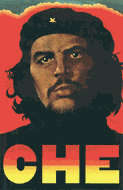Che Guevara

Che Guevara
1928–67, Cuban revolutionary and political leader
October 9 marks the anniversary of Ernesto "Che" Guevara's execution by Bolivian soldiers. Argentinian by birth, he played a crucial part in the Cuban revolution, as well as in Communist activity in other Latin American Countries. Despite his early demise, the volatile, idealistic Guevara has earned a permanent place in revolutionary history and mythology.
 Doctor to Castro confidante
Doctor to Castro confidante
Originally trained as a physician at the University of Buenos Aires, Che Guevara took part (1952) in riots against the dictator Juan Perón in Argentina, joined agitators in Bolivia, and worked in a leper colony.
In 1953 he went to Guatemala, joined the pro-Communist regime of Jacobo Arbenz Guzmán, and when Arbenz was overthrown (1954) fled to Mexico, where he met Fidel Castro and other Cuban rebels.
Solidifying ties to the Communist bloc
Che became Castro's chief lieutenant soon after the rebel invasion of Cuba in 1956. He proved to be a resourceful guerrilla leader and was soon one of Castro's closest and most trusted friends.
As president of the national bank after the fall (January 1959) of Fulgencio Batista he was instrumental in cutting Cuba's traditional economic ties with the United States and in directing the flow of trade to the Communist bloc.
Revolutionary at heart
From 1961–65, he served as Cuba's minister of industry. At heart a revolutionary rather than an administrator, he left Cuba in 1965 to foster revolutionary activity in other countries. In 1967, while directing a guerrilla movement in Bolivia, he was wounded in a clash with government troops, captured, and executed.
In the span of his short-lived life, Guevara wrote Guerrilla Warfare (1961), Man and Socialism in Cuba (1967), and Reminiscences of the Cuban Revolutionary War (1968).
